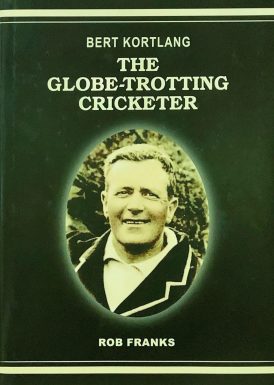Bert Kortlang: The Globe-Trotting Cricketer
Martin Chandler |Published: 2022
Pages: 179
Author: Franks, Rob
Publisher: The Cricket Publishing Company
Rating: 4 stars

Between 1909 and 1912 Bert Kortlang played three summers of First Class cricket in Australia, and four more in New Zealand between 1922 and 1927. In a total of 35 appearances he averaged just a tick under fifty with the bat, so a decent player, but he was never picked to represent the country of his birth in a Test, and his time in New Zealand pre-dated that country’s elevation to Test status.
Which all rather begs the question as to why New Zealander Rob Franks should want to put what was obviously a vast amount of work into researching Kortlang’s life. It is not as if Kortlang achieved enduring fame in any other field, nor indeed notoriety. Nonetheless he did lead an interesting life, hence his story finding its way into print more than sixty years after his death, at the age of 80, in 1961.
As the title of the book suggests travel was high on Kortlang’s list of priorities and favoured destinations were the Americas, North and South, and the Caribbean, and many trips were made over the years. There were occasional visits to Europe, but in the main it was generally all stops between Australia and/or New Zealand and the Americas. Other than on a couple of occasions Asia and Africa seem not to have been on Kortland’s bucket list.
And what did Kortlang do to earn a living on these trips? At one point in the closing chapters Franks provides a list of 28 occupations. That is not employments, as of those there would have been many more, including Kortlang himself, as there were a number of business ventures of his own. As for the actual jobs Kortlang did there are a huge variety ranging from gold prospecting to private detective, and from engineer to surveyor.
It was not, of course, all work for Kortlang and cricket was a constant theme in his life even if he wasn’t playing the First Class game. Standards of play varied depending on where Kortlang was at any given time but he was always a heavy scorer and, although they were not arts he used to any extent in those 35 First Class games, he was also a fine wicketkeeper and a useful leg spinner.
Two other sports feature regularly in the book, those being baseball, at which Kortlang also showed great talent both in Australia and North America, and billiards. The latter is by its nature rather more sedate, although Kortlang was clearly a considerable exponent, albeit he did not pick up all of the titles sometimes attributed to him. It may well be that, given his not inconsiderable abilities as a self publicist, Kortlang may have allowed a misleading impression to be created in order to further another of his businesses, that of Billiards Tutor.
One of the regular Kortlang jobs was a salesman/rep/agent. Call it what you will Kortlang had mixed success with his projects and, as Anno Domjni encroached on his ability to play regular sport, he took to writing and journalism became a regular part of his career and, amongst other assignments, he followed the 1930 Australians round England, in the course of which he struck up what became a lifelong friendship with Donald Bradman, and he covered the 1931/32 South African visit to Australia for an English newspaper.
In 1937 Kortlang treated his readers to a series of newspaper articles looking back on his remarkable life, and those started Rob Franks off on his journey. Contemporary shipping records and other public documents enabled him to follow much of Kortlang’s journey and, a man who never shunned publicity, Kortlang’s name often appeared in newspapers in the towns and cities he spent his time, all very helpful stuff for the biographer and his putative readership.
In time Kortlang got the burning desire for endless travel out of his system and settled down, the location he chose being Western Australia. There he married for a second time and on this occasion the marriage was one that endured and there was a daughter Jan who, as in every biographer’s dream, was located, happy to co-operate and had a family archive to share.
One of the items in the archive was a letter written to the family by Bradman after Kortland’s death, in which The Don described him as having led a wonderful life. In that context the phrase is of course often used, generally with at least an element of hyperbole. But not here and the efforts of Rob Franks and his publisher do full justice to that wonderful life.






Leave a comment